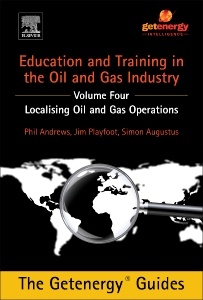Description
Education and Training for the Oil and Gas Industry
Localising Oil and Gas Operations
Authors: Andrews Phil, Playfoot Jim, Augustus Simon
Language: English
Subject for Education and Training for the Oil and Gas Industry:
80.59 €
In Print (Delivery period: 14 days).
Add to cartSupport: Print on demand
Description
/li>Contents
/li>Readership
/li>Biography
/li>Comment
/li>
Education and Training for the Oil and Gas Industry: Localising Oil and Gas Operations, Volume Four in the Getenergy series will set out the case for localising the oil and gas operations within hydrocarbon-producing countries. The focus of this final Volume in the series will be to explore the value of engaging with local suppliers, local talent and other local stakeholders in the exploration and production of oil and gas resources. Specifically, we will set out an agenda around which operators and service companies can coalesce and that highlights the ways in which smart, targeted investments in education, training and local infrastructure can create a new way of doing business, particularly in developing or emerging energy economies. Getenergy Intelligence have developed a unique tool to evaluate the potential cost benefits of localisation for any given project. This volume lays out the rationale, methodology and processes we have developed to successfully map out localisation and implement strategic capacity development for oil and gas operations.
The significant cost benefits of localisation have been recognised by a number of major oil and gas companies, but localisation is still an aspect of doing business that is poorly understood by much of the global industry. In the first section of this book, the authors provide the rationale for localisation and layout the core reasons for developing the tool. In the second section, the tool is described and the exact methodology is explained. In the final section the authors provide three case studies, demonstrating the tool in action and showing how we are able to measure the cost effectiveness and wider value of a coherent approach to localisation.
Chapter 1. The Rationale for Localisation
Chapter 2. Understanding Localisation
Chapter 3. The Legacy of Education and Training
International oil companies, local subsidiaries, supply chain organisations, national oil companies and governments seeking to better understand how stakeholder interest can align and how localisation can significantly impact the efficiency of E&P operations
Jim is a consultant, researcher and writer working in the field of education and skills development. He is Founder and Managing Director of the London-based education consultancy White Loop. Jim’s work over the last 10 years has focussed on understanding the dynamic between education and employment, exploring the challenges of how we prepare young people for the twenty-first century and developing new thinking around how education can have real impact on wellbeing and quality of life. Jim’s work is built around a deep understanding of how people learn allied to an ability to engage, analyse and interpret evidence and opinion and produce outputs that are compelling and accessible. He has worked with partners and collaborators in more than 20 countries around the world
- Three detailed case studies exploring the benefits of localising the oil and gas workforce
- A rigorous economic rationale for localisation of oil and gas projects. Explores how localisation (and investment in local education, training and talent within that) is at the core of a successful oil and gas business in the 21st century
- Methods of implementing a strategy to educate and train local people in order to meet the core business needs around individual oil and gas projects




